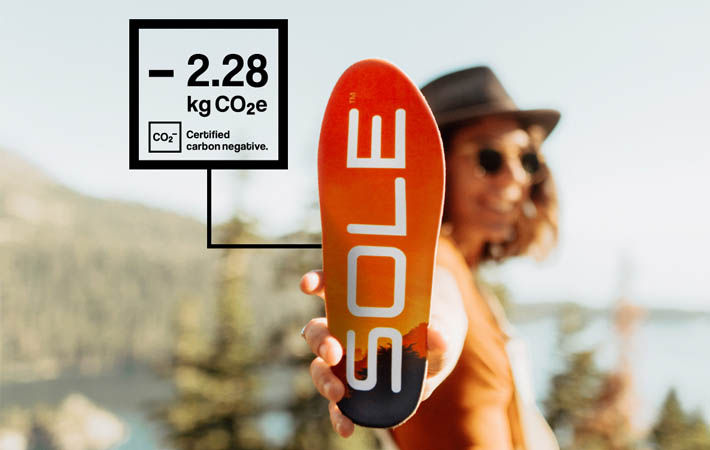Canadian footwear company, Sole, has launched CO2negative, an initiative to promote and facilitate accurate climate impact labelling on consumer products, and certify carbon-negative products. The initiative follows Sole’s commitment to labelling all core line products with precise CO2e impact data, so that customers can make informed purchasing decisions.
CO2negative is founded on the conviction that businesses can, and must, do more to accurately account for their impact on the planet, and that consumers deserve the information they need to make properly educated climate-conscious purchasing decisions. Sole has launched CO2negative to add their voice to growing calls for universal climate impact labelling, and to highlight the incredible potential for creating products that are actually good for the planet, using natural cork. CO2negative’s central thesis is that when it comes to carbon, neutral is not enough. In the face of the climate crisis, it falls on businesses to ensure their impact on the planet is not only carbon neutral, but carbon negative: removing more greenhouse gases from the atmosphere than they add, the company said in a press release.Canadian footwear company, Sole, has launched CO2negative, an initiative to promote and facilitate accurate climate impact labelling on consumer products, and certify carbon-negative products. The initiative follows Sole's commitment to labelling all core line products with precise CO2e impact data, so that customers can make informed purchasing decisions.#
Sole has launched their first CO2negative certified carbon negative collection; the performance footbed collection. Created using ReCork Recycled Cork, the Performance Medium footbed has a carbon impact of -2.28kg CO2e (Carbon Dioxide equivalent), that’s 2.28kg CO2e removed from the atmosphere. This incredible number is thanks to the sustainability of natural cork. Cork is harvested from the bark of carbon-trapping cork oak trees, without ever cutting a tree down. For every kilogram of cork harvested, cork oak forests sequester an average of 55kg of CO2 from the atmosphere. CO2negative accounts for this sequestered carbon when calculating the final impact of products made with natural cork.
Products created using enough cork will often be carbon negative: all the greenhouse gas emissions associated with the product’s life cycle will come to less than the CO2 sequestered by cork oak trees while growing the cork used in the product. By accounting for the role of cork forests in their calculations, CO2negative hopes to highlight the benefit of utilising existing materials that are good for the planet, in place of harmful petroleum-based foams and plastics, according to Sole.
While not all products can be made carbon-negative from the outset, all products’ carbon impacts can be offset. CO2negative will also offer carbon negative certification on a product-specific or company-wide basis to any product or company that shows its impacts have been offset by a minimum of 110 per cent. In this way, consumers can rest easy in the knowledge that supporting any CO2negative certified carbon negative means having the right kind of impact on climate stability.
Sole has committed to being carbon negative starting in 2022. Once year end is complete and all data for 2021 is collected, Sole will offset 110 per cent of all emissions from 2021 through ReCork tree planting initiatives. Sole and ReCork continue to push the status quo and are set to embark on a range of exciting new planet-friendly product launches and collaborations with industry leaders.
Fibre2Fashion News Desk (GK)
